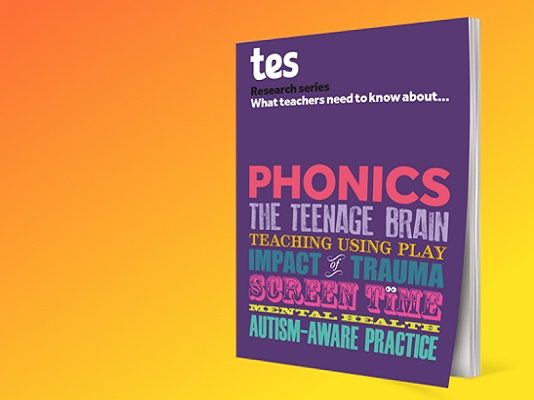17Uploads
75k+Views
21k+Downloads
Literacy for early childhood
Bundle

Tes Research Series Volumes 1-5
Save £27.50! Get all five editions of the Tes research series for just £10
Included within the bundle:
Volume One
Being a research-informed professional
How memory works
Dyslexia
Growth Mindset
The use of play in education
How we learn to read
Autism
Volume Two
Spotting research myths
Tackling literacy problems in secondary
The role of genetics in education
How to judge teacher and school effectiveness
Why you’re probably not making the most of your teaching assistants
What every teacher needs to know about setting
Gender stereotyping in schools – its damaging effects and how to prevent it
Understanding race in education
Volume Three
Character
Language development support
Executive function
Teacher talk
EAL interventions
Limits of research
Direct instruction
Volume Four
What teachers need to know about the teenage brain
Why phonics is crucial – even for those who won’t ‘get’ it
How to support autistic pupils
Learning through play: what are the benefits?
What every teacher needs to know about the impact of trauma
The truth about screen time, tech and young people
The truth about mental health in schools
Volume Five
The limitations of child-led learning, with Professor David Gear
A joined-up approach to comprehension, with Professor Jane Oakhill
Teaching the ‘unteachable’, with Dr Simon Edwards
Why counting isn’t as easy as 1, 2, 3, with Professor Daniel Ansari
The pros and cons of peer influence, with Professor Brett Laursen
Minding the gap in primary mental health, with Dr Wendy Sims-Schouten
How premature birth can affect learning, with Professor Samantha Johnson

Tes Research series: volume four
The Tes Research series: volume four will provide you with the information you need to know about:
What teachers need to know about the teenage brain:
Sarah-Jayne Blakemore discusses teenage brain development and her latest research. At the time of the interview she was professor of cognitive neuroscience at the Institute of Cognitive Neuroscience, University College London. She has since been appointed Professor of Psychology in the Social Sciences at University of Cambridge. Her award-winning book ‘Inventing Ourselves: the secret life of the teenage brain’ received the Royal Society Insight Investment Science Book Prize 2018. - P. 6
Why phonics is crucial – even for those who won’t ‘get’ it:
Anne Castles explains when and why phonics is useful in early childhood development. Anne is a distinguished Professor in the Department of Cognitive Science at Macquarie University in Sydney, Australia. Her research focuses on reading development and dyslexia, with a particular interest in variability within the reading-impaired population and the causes of different types of dyslexia. - P. 12
How to support autistic pupils:
Dr Luke Beardon is a senior lecturer working within The Autism Centre at Sheffield Hallam University. Here he explains why he believes autistic children have an unnecessarily challenging time in school and offers three practical processes that schools can abide by that ensure the autistic child’s needs are met. - P. 20
Learning through play: what are the benefits?:
Psychologist David Whitebread says play is one of the most misunderstood topics in education. He is emeritus professor at the University of Cambridge and a developmental cognitive psychologist and early years specialist. Here he explains how here are robust benefits in language and self-regulation to play based approaches. - P. 27
What every teacher needs to know about the impact of trauma:
Essi Viding is professor of Developmental Psychopathology at University College London (UCL) and, together with Eamon McCrory, professor of developmental neuroscience and psychopathology at UCL, she studies the effects of trauma on a child’s behaviour at the Developmental Risk and Resilience Unit. This podcast discusses what every teacher should know about the impact of trauma. - P. 34
The truth about screen time, tech and young people:
Andrew Przybylski says much of the negative reputation of tech and screens is way ahead of the research, and schools need to recognise the reality. Andrew is associate professor in the department of psychology at the University of Oxford and director of research at the Oxford Internet Institute. - P. 40
The truth about mental health in schools:
Professor Tamsin Ford explains what the data actually says about mental health in schools and reveals what impact schools can have on the mental health of young people and teachers. She is a professor of child and adolescent psychiatry at the University of Exeter. - P. 45


